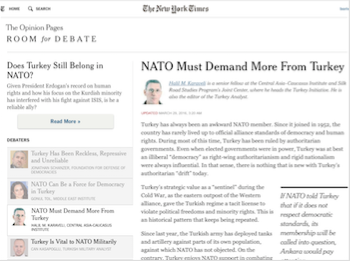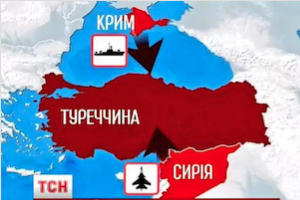NATO Must Demand More From Turkey

NATO Must Demand More From Turkey
By Halil M. Karaveli
Turkey has always been an awkward NATO member. Since it joined in 1952, the country has rarely lived up to official alliance standards of democracy and human rights. During most of this time, Turkey has been ruled by authoritarian governments. Even when elected governments were in power, Turkey was at best an illiberal “democracy” as right-wing authoritarianism and rigid nationalism were always influential. In that sense, there is nothing that is new with Turkey’s authoritarian “drift” today.
Turkiet är ett hot – inte en potentiell EU-medlem
Svenska Dagbladet, March 19, 2016.
Svante E. Cornell, Turkiet är ett hot – inte en potentiell EU-medlem.
EU borde akta sig för att knyta för nära band med Erdogans auktoritärt styrda Turkiet. Landet borgar inte för fred och säkerhet just nu. Tvärtom. Svante Cornell menar att det borde vara uteslutet att ens diskutera turkiskt EU-medlemskap medan hundratusentals kurder drivs från sina hem i sydöstra Turkiet.
Svante E. Cornell is Director of the Central Asia-Caucasus Institute & Silk Road Studies Program, a Joint Center affiliated with the Johns Hopkins University’s School of Advanced International Studies and the Stockholm-based Institute for Security and Development Policy.
How Turkish-Russian Tensions Affect Central Asia and the Caucasus
CACI Forum
Wednesday, March 23, 2016, from 5 to 7 p.m.
(reception at 5 p.m. with Georgian wine, followed by the main program at 5:30)
Russia's seizure of Crimea and Russia's ongoing military campaign in Syria have transformed the strategic landscape from the Eastern Mediterranean and Black Sea region to the Caspian area. Grave tensions between Russia and Turkey were mounting even before Putin and Erdogan launched into a florid and vituperative war of words, which continues unabated.
Our speakers will delve into the many levels of this confrontation, offer important perspectives on how it is affecting security and economic life in the Caucasus and Central Asia, and suggest where it all might lead.
A video recording of this event can be viewed on the SAIS Events channel on Youtube.
Speakers:
Eric Edelman, Roger Hertog Distinguished Practitioner-in-Residence at the Philip Merrill Center for Strategic Studies, SAIS
Avinoam Idan, Nonresident Senior Fellow, Central Asia-Caucasus Institute & Silk Road Studies Program
Vladislav Inozemtsev, Director and Founder, Center for Post-Industrial Studies, Moscow
Olga Oliker, Senior Adviser and Director, Russia and Eurasia Program, CSIS
Kurt Volker, Executive Director, McCain Institute, and former US Ambassador to NATO
Moderator: Svante Cornell, Director, Central Asia-Caucasus Institute
Rome Building Auditorium
SAIS - Johns Hopkins University
1619 Massachusetts Ave., NW
Washington, DC 20036
Click here to RSVP and register
Turkey's Decline. Ankara Must Learn From Its Past to Secure Its Future
Foreign Affairs, March 2, 2015.
Halil Karaveli: Turkey's Decline. Ankara Must Learn From Its Past to Secure Its Future.
In the aftermath of the Arab Spring in 2011, Ahmet Davutoglu, then Turkish minister of foreign affairs and now prime minister, vowed that Turkey would be the “game setter” of the Middle East. Today, such notions of grandeur seem outrageous.
Halil M. Karaveli is a Senior Fellow with the Turkey Initiative at the Central Asia-Caucasus Institute & Silk Road Studies Program Joint Center and managing editor of its publication The Turkey Analyst.
Turkey with the Brakes Off: What Does Erdogan's Victory Mean?

Turkey with the Brakes Off: What Does Erdogan's Victory Mean?
Wednesday, November 11, 2015, from 5 to 7 p.m.
(reception at 5 p.m., followed by main program at 5:30)
Turkey's ruling AKP restored its majority in parliament on Nov 1. But the election was held after President Erdogan refused to accept the June 7 election's results, sabotaged efforts to form a coalition government, relaunched war in the country’s southeast -– and after a massive suicide bombing in Ankara.
Will this election stabilize Turkey? What does this election mean for Turkey's regional posture, and what kind of partner will it be for the U.S.?
Speakers at this forum will draw from Turkey Transformed, a recently published study in which CACI scholars partnered with the Bipartisan Policy Center to investigate Turkey's transformation under Erdogan.
Speakers:
Eric S. Edelman
Former U.S. Ambassador to Turkey and Undersecretary of Defense for Policy
Svante E. Cornell
Director, Central Asia-Caucasus Institute
Blaise Misztal
Director of Foreign Policy, Bipartisan Policy Center
Alan Makovsky
Senior Fellow, Center for American Progress
John Hannah (TBC)
Senior Advisor, Foundation for the Defense of Democracies
Moderator: Mamuka Tsereteli, Research Director, Central Asia-Caucasus Institute
Location:
Rome Building, Room 806
SAIS - Johns Hopkins University
1717 Massachusetts Ave., NW
Washington, DC 20036


